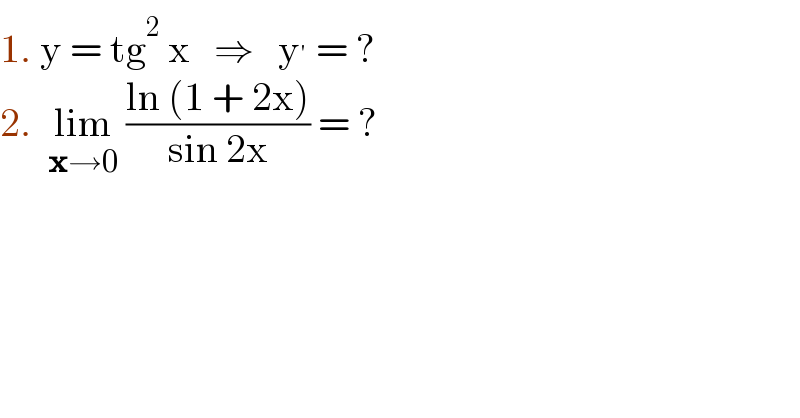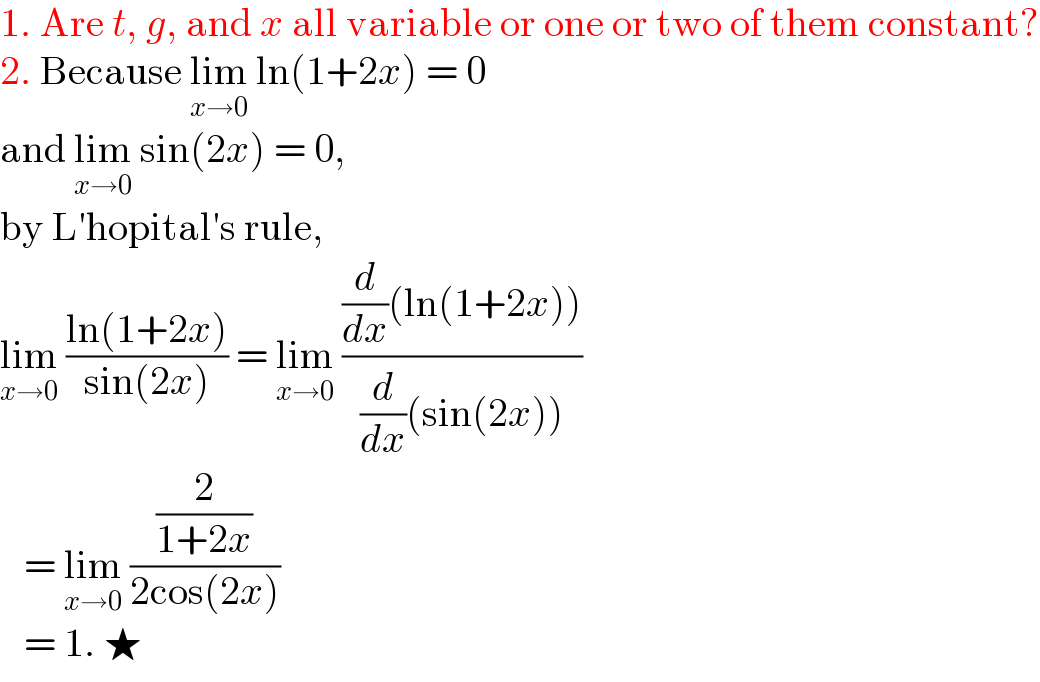
Question Number 203158 by hardmath last updated on 11/Jan/24

$$\mathrm{1}.\:\mathrm{y}\:=\:\mathrm{tg}^{\mathrm{2}} \:\mathrm{x}\:\:\:\Rightarrow\:\:\:\mathrm{y}^{'} \:=\:? \\ $$$$\mathrm{2}.\:\:\underset{\boldsymbol{\mathrm{x}}\rightarrow\mathrm{0}} {\mathrm{lim}}\:\frac{\mathrm{ln}\:\left(\mathrm{1}\:+\:\mathrm{2x}\right)}{\mathrm{sin}\:\mathrm{2x}}\:=\:? \\ $$
Answered by shunmisaki007 last updated on 11/Jan/24

$$\mathrm{1}.\:\mathrm{Are}\:{t},\:{g},\:\mathrm{and}\:{x}\:\mathrm{all}\:\mathrm{variable}\:\mathrm{or}\:\mathrm{one}\:\mathrm{or}\:\mathrm{two}\:\mathrm{of}\:\mathrm{them}\:\mathrm{constant}? \\ $$$$\mathrm{2}.\:\mathrm{Because}\:\underset{{x}\rightarrow\mathrm{0}} {\mathrm{lim}}\:\mathrm{ln}\left(\mathrm{1}+\mathrm{2}{x}\right)\:=\:\mathrm{0} \\ $$$$\mathrm{and}\:\underset{{x}\rightarrow\mathrm{0}} {\mathrm{lim}}\:\mathrm{sin}\left(\mathrm{2}{x}\right)\:=\:\mathrm{0}, \\ $$$$\mathrm{by}\:\mathrm{L}'\mathrm{hopital}'\mathrm{s}\:\mathrm{rule}, \\ $$$$\underset{{x}\rightarrow\mathrm{0}} {\mathrm{lim}}\:\frac{\mathrm{ln}\left(\mathrm{1}+\mathrm{2}{x}\right)}{\mathrm{sin}\left(\mathrm{2}{x}\right)}\:=\:\underset{{x}\rightarrow\mathrm{0}} {\mathrm{lim}}\:\frac{\frac{{d}}{{dx}}\left(\mathrm{ln}\left(\mathrm{1}+\mathrm{2}{x}\right)\right)}{\frac{{d}}{{dx}}\left(\mathrm{sin}\left(\mathrm{2}{x}\right)\right)} \\ $$$$\:\:\:=\:\underset{{x}\rightarrow\mathrm{0}} {\mathrm{lim}}\:\frac{\frac{\mathrm{2}}{\mathrm{1}+\mathrm{2}{x}}}{\mathrm{2cos}\left(\mathrm{2}{x}\right)} \\ $$$$\:\:\:=\:\mathrm{1}.\:\bigstar \\ $$
Commented by Frix last updated on 11/Jan/24

$${tg}\:{x}\:=\mathrm{tan}\:{x} \\ $$$${tg}^{\mathrm{2}} \:{x}\:=\mathrm{tan}^{\mathrm{2}} \:{x}\:=\left(\mathrm{tan}\:{x}\right)^{\mathrm{2}} \\ $$
Answered by witcher3 last updated on 11/Jan/24

$$=\underset{{x}\rightarrow\mathrm{0}} {\mathrm{lim}}\frac{\mathrm{ln}\left(\mathrm{1}+\mathrm{2x}\right)}{\mathrm{2x}}.\frac{\mathrm{1}}{\frac{\mathrm{sin}\left(\mathrm{2x}\right)}{\mathrm{2x}}}=\mathrm{1}.\frac{\mathrm{1}}{\mathrm{1}}=\mathrm{1} \\ $$
Answered by shunmisaki007 last updated on 11/Jan/24

$$\mathrm{1}.\:{y}=\mathrm{tan}^{\mathrm{2}} \left({x}\right) \\ $$$${y}'=\mathrm{2tan}\left({x}\right)\mathrm{sec}^{\mathrm{2}} \left({x}\right)=\mathrm{2tan}\left({x}\right)+\mathrm{2tan}^{\mathrm{3}} \left({x}\right)\:\bigstar \\ $$
Commented by Frix last updated on 11/Jan/24
��
